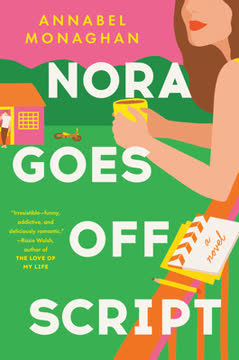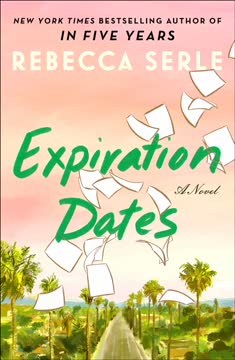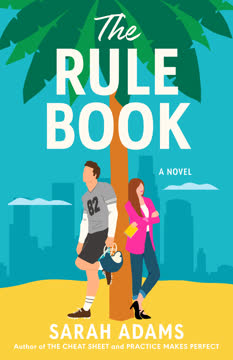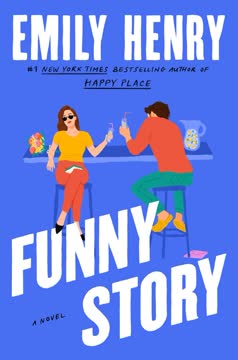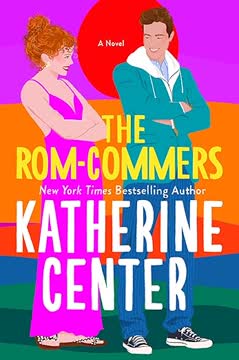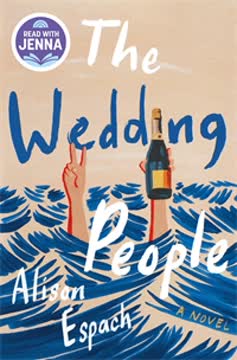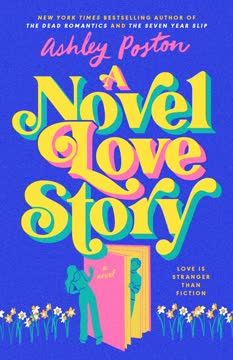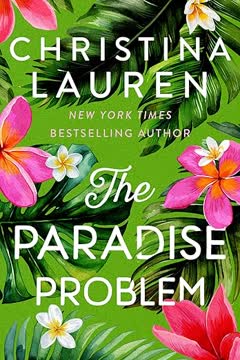Plot Summary
Hollywood's Unexpected Arrival
Nora Hamilton, a romance screenwriter, finds her life upended when Hollywood comes to her doorstep. Her screenplay, "The Tea House," is being made into a movie, and the production crew, including the charming actor Leo Vance, arrives to film at her home. This unexpected event offers Nora a financial lifeline and a chance to escape her mundane routine. As the crew settles in, Nora's life begins to intertwine with the glamorous world of filmmaking, setting the stage for unexpected changes.
A Star in the Tea House
Leo Vance, a Hollywood superstar, decides to stay in Nora's tea house, seeking solace from his chaotic life. As they spend time together, a bond forms between them, leading to a whirlwind romance. Leo's presence brings excitement and a sense of adventure to Nora's life, but it also stirs up emotions and challenges she hadn't anticipated. Their connection deepens, but the reality of Leo's world looms large, threatening to disrupt the fragile happiness they've found.
Love and Lies Unravel
Just as Nora and Leo's relationship blossoms, Leo is called back to Hollywood for a new film. Miscommunication and a lie told by Nora's son, Arthur, lead Leo to believe Nora has reconciled with her estranged husband, Ben. Heartbroken, Leo leaves without explanation, and Nora is left to pick up the pieces. The misunderstanding creates a rift that seems insurmountable, leaving Nora to question the authenticity of their love.
Heartbreak and Healing
In the aftermath of Leo's departure, Nora struggles with the pain of lost love. She focuses on her children and her writing, trying to find solace in her work. As she processes her emotions, Nora begins to understand the depth of her feelings for Leo and the impact of their time together. She learns to navigate life without him, finding strength in her independence and the support of her family and friends.
A New Beginning
Nora's screenplay, "The Tea House," garners critical acclaim, earning her an Oscar nomination. The success of the film brings new opportunities and a sense of validation for Nora. As she prepares for the Oscars, she reflects on her journey and the lessons learned from her relationship with Leo. The experience has transformed her, and she embraces the future with renewed confidence and hope.
The Oscar Nomination
At the Oscars, Nora is celebrated for her work, but the event also brings her face-to-face with Leo. The encounter is charged with unresolved emotions, but it offers a chance for closure. As they navigate the complexities of their past, Nora and Leo find a way to acknowledge their shared history and the impact they've had on each other's lives.
Truths and Reconciliation
Arthur reveals the truth about the lie he told Leo, which had driven them apart. This revelation opens the door for reconciliation, as Leo realizes the misunderstanding that kept them apart. With the truth out in the open, Nora and Leo have the opportunity to rebuild their relationship on a foundation of honesty and trust.
A Wedding Under the Stars
Nora and Leo's love story comes full circle as they marry in a beautiful ceremony at the tea house. Surrounded by family and friends, they celebrate their commitment to each other and the life they've chosen to build together. The wedding symbolizes a new beginning, filled with love, hope, and the promise of a shared future.
Characters
Nora Hamilton
Nora is a romance screenwriter whose life is transformed by the arrival of Hollywood. Her journey from heartbreak to healing is marked by her resilience and introspection. As she navigates the complexities of love and loss, Nora learns to embrace her independence and the power of her own voice.
Leo Vance
A Hollywood superstar seeking refuge from his chaotic life, Leo finds solace in Nora's tea house. His charm and vulnerability draw Nora in, but his world of fame and misunderstandings create obstacles. Leo's journey is one of self-discovery, as he learns to reconcile his public persona with his true self.
Arthur Hamilton
Nora's son, Arthur, plays a pivotal role in the story. His innocent lie about his father's return sets off a chain of events that leads to the misunderstanding between Nora and Leo. Arthur's actions, though misguided, ultimately bring about the truth and pave the way for reconciliation.
Bernadette Hamilton
Nora's daughter, Bernadette, brings light and joy to the story. Her perceptive nature and unwavering support for her mother provide comfort and strength. Bernadette's presence is a reminder of the importance of family and the power of love.
Ben Hamilton
Nora's estranged husband, Ben, is a looming presence throughout the story. His departure and absence create a void in Nora's life, but also offer her the freedom to rediscover herself. Ben's influence is felt in the choices Nora makes and the path she ultimately chooses.
Weezie
Leo's assistant, Weezie, is a constant source of support and resourcefulness. Her loyalty to Leo and her friendship with Nora provide stability amidst the chaos. Weezie's presence is a reminder of the importance of friendship and the strength found in community.
Penny
Nora's sister, Penny, offers a pragmatic perspective on Nora's journey. Her loyalty and unwavering support provide Nora with the grounding she needs to navigate the ups and downs of her relationship with Leo. Penny's presence is a testament to the power of sisterhood.
Kate
Nora's friend, Kate, is a source of empathy and protection. Her understanding and guidance help Nora through her darkest moments. Kate's role in the story highlights the importance of friendship and the strength found in shared experiences.
Martin
The director of "The Tea House," Martin is a visionary who recognizes Nora's talent. His support and belief in her work play a crucial role in her success. Martin's presence is a reminder of the power of collaboration and the impact of mentorship.
Naomi Sanchez
Leo's co-star and rumored love interest, Naomi represents the glamorous world of Hollywood. Her presence in the story serves as a contrast to Nora's grounded reality. Naomi's role highlights the challenges of navigating fame and the complexities of public perception.
Plot Devices
Miscommunication and Misunderstanding
The story hinges on a critical miscommunication between Nora and Leo, driven by Arthur's innocent lie. This misunderstanding creates the central conflict, leading to heartbreak and separation. The resolution of this miscommunication is key to the story's climax and ultimate reconciliation.
The Tea House
The tea house serves as a central symbol in the story, representing transformation and refuge. It is the place where Nora and Leo's relationship blossoms and where Nora finds solace and inspiration. The tea house is a metaphor for the journey of self-discovery and healing.
Hollywood and Fame
The world of Hollywood and fame serves as a backdrop to Nora's grounded reality. The contrast between these two worlds highlights the challenges and complexities of love and identity. Hollywood's influence is both a catalyst for change and a source of conflict in the story.
The Sunrise
The sunrise is a recurring motif in the story, symbolizing hope and renewal. It is a moment of reflection and clarity for Nora, offering her a sense of peace and perspective. The sunrise serves as a reminder of the beauty and possibility of new beginnings.
Analysis
"Nora Goes Off Script" is a poignant exploration of love, identity, and resilience. Through Nora's journey, the story examines the complexities of relationships and the power of self-discovery. The narrative challenges traditional notions of romance, highlighting the importance of personal growth and the strength found in vulnerability. The story's resolution offers a hopeful message about the possibility of new beginnings and the transformative power of love.
Last updated:
FAQ
Synopsis & Basic Details
What is Nora Goes Off Script about?
- A Screenwriter's Unexpected Reality: Nora Hamilton, a romance screenwriter known for her formulaic, happy-ending TV movies, finds her quiet suburban life upended when a major film studio decides to adapt her deeply personal, post-divorce screenplay, "The Tea House," into a feature film. The production, starring Hollywood heartthrob Leo Vance, sets up shop in her actual home, forcing Nora to confront the raw emotions she poured onto the page.
- Whirlwind Romance Amidst Chaos: As Leo Vance seeks refuge from his own fame and personal struggles in Nora's charming, dilapidated tea house, an unexpected and intense romance blossoms between them. Their connection is a stark contrast to Nora's previous marriage, offering her a taste of genuine intimacy and a challenge to her carefully constructed emotional defenses.
- Love, Lies, and Second Chances: The story navigates the complexities of new love, the lingering pain of past relationships, and the impact of family secrets. A misunderstanding, fueled by Nora's son Arthur, drives Leo away, leaving Nora heartbroken once more. However, the success of her film and the eventual revelation of the truth pave the way for a poignant journey of reconciliation, self-discovery, and a truly off-script happy ending.
Why should I read Nora Goes Off Script?
- Relatable Emotional Depth: Readers should dive into Nora Goes Off Script for its honest portrayal of post-divorce healing, the messy reality of single parenthood, and the exhilarating, terrifying leap into new love. Nora's internal monologues are witty, vulnerable, and deeply relatable, making her journey of self-discovery resonate long after the final page.
- Charming Subversion of Tropes: Annabel Monaghan masterfully uses Nora's profession as a romance screenwriter to both embrace and cleverly subvert genre conventions. The novel offers a delightful blend of laugh-out-loud humor and genuine emotional stakes, appealing to those who enjoy a smart, feel-good story with unexpected twists.
- Escape and Inspiration: Beyond the romance, the book explores themes of authenticity, personal power, and finding joy in the everyday. It's an inspiring read for anyone who has felt "used up and tossed aside," demonstrating that even in the most ordinary lives, extraordinary stories and second chances can bloom.
What is the background of Nora Goes Off Script?
- Suburban Life vs. Hollywood Glamour: The novel is set in the quaint, unchanging town of Laurel Ridge, a deliberate contrast to the fast-paced, image-obsessed world of Hollywood. This geographical and cultural juxtaposition highlights Nora's grounded reality against Leo's celebrity, emphasizing themes of authenticity and the search for a "normal" life.
- The Romance Channel as a Cultural Touchstone: Nora's career writing for "The Romance Channel" (TRC) serves as a meta-commentary on popular romance tropes. The predictable formulas of TRC movies—the "meet cute," the "community event," the "hero's return"—are constantly referenced, allowing the author to both poke fun at and ultimately deliver a story that transcends these conventions.
- Post-Divorce Landscape: The story is deeply rooted in the emotional and practical aftermath of Nora's divorce from Ben. It explores the financial struggles, the impact on children, and the slow, often painful process of rebuilding identity and self-worth after a long, unfulfilling marriage, providing a realistic backdrop for Nora's journey.
What are the most memorable quotes in Nora Goes Off Script?
- "If someone leaves you, it's because they didn't want to be with you. All you lost was someone who didn't want to be there anyway." (Chapter 2): This quote encapsulates Nora's initial, hardened philosophy on abandonment, a defense mechanism developed after Ben's departure. It's a pivotal line that defines her early emotional state and sets up her journey toward vulnerability and genuine love.
- "You're the first person I've ever been in love with." (Chapter 12): Leo Vance's declaration, delivered casually during a run in a wildflower meadow, is a shocking and deeply significant turning point. It shatters Nora's carefully constructed emotional walls and confirms the profound, unexpected depth of their connection, making her question her "unromantic" self-perception.
- "It's wonderful to speak your truth and be heard." (Chapter 21): Nora's ad-libbed Oscar acceptance speech perfectly summarizes her journey as a writer and a woman. It highlights the transformative power of telling her authentic story, not just for her career, but for her personal healing and the validation of her experiences.
What writing style, narrative choices, and literary techniques does Annabel Monaghan use?
- Intimate First-Person Narration: Annabel Monaghan employs a highly engaging first-person narrative from Nora's perspective, characterized by a conversational, witty, and often self-deprecating tone. This choice allows readers direct access to Nora's internal monologues, anxieties, and humorous observations, fostering a deep sense of intimacy and relatability.
- Meta-Narrative and Genre Awareness: A key literary technique is the novel's meta-narrative, where Nora, as a romance screenwriter, constantly analyzes her own life through the lens of genre tropes. This self-awareness allows Monaghan to both celebrate and subvert the conventions of romantic comedy, adding layers of irony and charm to the storytelling.
- Emotional Honesty and Humorous Pacing: Monaghan skillfully balances moments of profound emotional vulnerability and heartbreak with sharp, observational humor. The pacing shifts between the whirlwind excitement of new love and the slower, more introspective periods of healing, creating a dynamic reading experience that feels both authentic and entertaining.
Hidden Details & Subtle Connections
What are some minor details that add significant meaning?
- Leo's "Missing Dimple" Observation: Early in the story, Leo tells Nora, "You're missing a dimple," then later finds it on Bernadette's cheek. This seemingly throwaway line subtly foreshadows Leo's perceptive nature and his ability to see Nora's deeper, more vulnerable self reflected in her daughter, long before their romance begins. It highlights his unique way of "noticing things," a trait Nora appreciates.
- Nora's Crossword Puzzle Ritual: Nora's Wednesday crossword puzzle is a small, personal routine that Leo immediately disrupts by doing it himself, then later integrates into their shared mornings. This detail symbolizes Leo's effortless intrusion into Nora's carefully structured, solitary life and how he becomes an unexpected, yet welcome, part of her intellectual and domestic world.
- The "Magic Shoes" at the Premiere: Nora's expensive silver shoes, initially dismissed as "ridiculously overpriced," transform her perception of herself at the premiere. They represent a tangible shift in her self-worth and confidence, allowing her to "sparkle" and embrace her success, rather than shrinking from the spotlight. This detail underscores her journey from self-doubt to self-acceptance.
What are some subtle foreshadowing and callbacks?
- Ben's "Weird Sentence Structure": Nora recalls Ben's first words to her, "I've never met you," noting its "weird sentence structure" that puts the focus on him. This subtle detail foreshadows Ben's pervasive self-centeredness and inability to truly connect with others, a trait that ultimately leads to their divorce and Nora's emotional liberation.
- Leo's "Smolder" vs. "Real Smile": Nora frequently observes Leo's famous "smolder" as an acting affectation, contrasting it with his "real smile" which she sees only in unguarded moments, particularly when he's genuinely happy or proud (e.g., watching Arthur). This distinction subtly highlights Leo's struggle with authenticity and his journey towards revealing his true self to Nora, making his genuine smiles a powerful indicator of his emotional investment.
- The "Scarcity in Your Heart" Accusation: Ben's cruel remark, "You have scarcity in your heart, Nora. You'll always be broke," is a callback to Nora's past financial anxieties and Ben's manipulative nature. Her later financial success and ability to "splurge" on renovations and her children's future directly refutes Ben's judgment, symbolizing her complete liberation from his influence and her newfound abundance, both material and emotional.
What are some unexpected character connections?
- Mr. Mapleton as a Town Confidante: The hardware store owner, Mr. Mapleton, initially appears as a minor character, but his candid comments about Ben ("That Ben's got everything but a job") and his protective stance towards Nora ("I'll have my eye on you" to Leo) reveal him as a quiet, observant pillar of the community. He represents the town's collective, unspoken support for Nora, validating her experiences and subtly influencing Leo's perception of her.
- Leo's Family (Luke, William, Jenn) as a Mirror: Leo's brother Luke, his father William, and Luke's wife Jenn, though introduced late, provide a crucial connection to Leo's authentic self. Their grounded, open personalities and their shared understanding of Leo's struggles (e.g., his mother's death, his "moping around") offer Nora a glimpse into the family dynamics that shaped him, making his character more fully realized and less of a celebrity enigma.
- Arthur's Protective Lie: Arthur's "innocent" lie about Ben's return, driven by a desire to protect his mother and punish Leo, creates an unexpected and profound connection between Arthur and Leo. It reveals Arthur's deep emotional intelligence and his struggle with his father's abandonment, ultimately becoming the catalyst for Leo's own heartbreak and eventual reconciliation with Nora. This highlights the complex emotional landscape of the Hamilton family.
Who are the most significant supporting characters?
- Arthur Hamilton: The Unwitting Catalyst: Arthur's deep-seated pain over Ben's abandonment and his protective instincts towards Nora lead him to tell the pivotal lie that drives Leo away. His actions, though misguided, are the central plot device for the story's main conflict and Leo's eventual return, making him far more than just a child character. His journey with Leo through "Oliver Twist" also highlights Leo's capacity for genuine connection and mentorship.
- Penny: The Pragmatic Cheerleader: Nora's sister, Penny, serves as a crucial sounding board and a source of both practical advice and aspirational thinking. Her "just" philosophy ("Just buy the shoes," "Just write an epic romance") pushes Nora out of her comfort zone, while her fierce loyalty and unwavering belief in Nora's worth provide essential emotional support, especially during Nora's heartbreak and Oscar journey.
- Kate: The Grounding Force: Kate, Nora's best friend, acts as Nora's emotional anchor and reality check. Her empathetic presence, willingness to listen without judgment, and practical support (e.g., taking the kids, helping Nora process Leo's departure) provide a vital counterpoint to Nora's internal turmoil. Kate's role underscores the theme of female friendship as a source of strength and resilience.
Psychological, Emotional, & Relational Analysis
What are some unspoken motivations of the characters?
- Leo's Escape from Curated Existence: Leo's initial decision to stay in Nora's tea house, despite its rustic conditions, is driven by an unspoken desire to escape his highly curated, inauthentic celebrity life. His comment about "disappearing" and having "the truest parts of yourself replaced by someone else's plans" reveals a deep yearning for genuine experience and personal agency, a motivation far beyond simple "rest."
- Nora's Fear of Reciprocal Vulnerability: While Nora champions her "self-correcting problem" philosophy, her reluctance to fully express her pain or vulnerability, even to Leo, stems from an unspoken fear of being hurt again. Her internal struggle to "not look like a loser" or "a lovesick kid" reveals a protective mechanism that, ironically, contributes to the initial misunderstanding with Leo.
- Arthur's Desire for Parental Stability: Arthur's lie about Ben's return is motivated by an unspoken, profound longing for a stable, complete family unit. He wants to "get back at Dad" for leaving, but also to secure Nora's happiness and, by extension, his own sense of security, highlighting the deep emotional impact of Ben's abandonment on his young psyche.
What psychological complexities do the characters exhibit?
- Nora's "Scarcity in Her Heart" Trauma: Nora exhibits a complex psychological response to her past financial and emotional deprivation by Ben. Her "prairie woman mentality" and initial discomfort with "nice things" are not just frugality, but a deep-seated trauma from Ben's aggressive spending and belittling. Her journey involves overcoming this "scarcity in her heart" to embrace abundance and self-worth.
- Leo's Authenticity Crisis and Grief: Leo's "free fall" after his mother's death reveals a profound authenticity crisis. He struggles with the performative nature of his celebrity, feeling like a "non-person" or "Silly Putty." His grief is complicated by the feeling that his mother was the "last woman in the world who knew me," driving his search for genuine connection and a life where he can make his own choices.
- Arthur's Misdirected Loyalty and Anger: Arthur's psychological complexity lies in his misdirected loyalty and anger. His lie, intended to protect Nora and punish Leo, is a manifestation of his unresolved pain from Ben's abandonment. This act, while causing conflict, also highlights his deep love for Nora and his struggle to process complex emotions in a healthy way, showcasing the psychological impact of divorce on children.
What are the major emotional turning points?
- Nora's Realization of Love for Leo: The emotional turning point for Nora occurs when Leo declares his love in the bird sanctuary. This moment shatters her carefully constructed emotional defenses, forcing her to acknowledge the depth of her feelings and the possibility of a love that transcends her cynical, formulaic expectations. It marks her shift from guarded independence to vulnerable openness.
- Leo's Heartbreak Over Arthur's Lie: Leo's discovery of Arthur's lie, believing Nora had reconciled with Ben, is a devastating emotional turning point for him. His genuine anger and declaration, "You broke my heart, dude," reveal the depth of his emotional investment in Nora and her family, proving that his feelings were not merely a "performance" or a temporary escape.
- Nora's Oscar Win and Self-Validation: Winning the Oscar for "The Tea House" is a powerful emotional turning point for Nora, symbolizing external validation of her truth and talent. It allows her to fully embrace her identity as a successful writer and a strong woman, moving beyond the need for external approval and finding peace in her own accomplishments.
How do relationship dynamics evolve?
- Nora and Leo: From Transactional to Transformative: Their relationship evolves from an initial transactional arrangement (Leo paying to stay) to a deep, transformative love. Initially, Nora views Leo as a temporary distraction, but through shared sunrises, intimate conversations, and his genuine connection with her children, their bond deepens into a partnership built on mutual respect, vulnerability, and shared joy, culminating in marriage.
- Nora and Her Children: Rebuilding Trust and Openness: After Ben's departure, Nora's relationship with Arthur and Bernadette becomes her primary focus. The dynamic shifts from her being solely responsible for their emotional well-being to a more open, communicative bond, especially after Arthur's lie. Nora learns to acknowledge their pain and her own, fostering a deeper trust and allowing them to process complex emotions together.
- Nora and Penny: Sisterly Support and Aspiration: The dynamic between Nora and her sister Penny evolves from a subtle undercurrent of Penny's "better" life to a relationship of fierce, reciprocal support. Penny's aspirational pushes (e.g., buying the shoes, writing a "big-screen love story") challenge Nora, while Nora's authentic journey inspires Penny, highlighting the strength and evolution of their sisterly bond.
Interpretation & Debate
Which parts of the story remain ambiguous or open-ended?
- Leo's True Intentions During His Initial Departure: While Arthur's lie is presented as the catalyst for Leo's departure, the story leaves some ambiguity about whether Leo would have truly returned as promised, given his history of "falling hard and then being out just as fast." His prior relationship with Naomi and his agent's comments ("None of them ever told me he'd said he loved them") suggest a pattern that Arthur's lie merely accelerated, leaving readers to ponder the full extent of his commitment at that time.
- The Sustainability of Nora and Leo's "Having It All" Future: The ending, with Nora and Leo marrying and planning a life that blends Hollywood glamour with Laurel Ridge normalcy, is undeniably happy. However, the practicalities of their combined lives—Leo's demanding career, their bicoastal existence, and the challenges of raising children in the spotlight—are largely glossed over. This leaves an open question about how they will navigate these complexities long-term, and whether their "happily ever after" will truly be as seamless as depicted.
- The Full Extent of Ben's Impact on Nora's Self-Perception: While Nora explicitly states she's "happier without him," the lingering effects of Ben's emotional abuse and financial irresponsibility are deeply ingrained in her. Her initial "scarcity in her heart"
Review Summary
Nora Goes Off Script received mostly positive reviews, with readers praising its charming characters, witty dialogue, and heartwarming story. Many appreciated the fresh take on a rom-com featuring a divorced mother as the protagonist. The slow-burn romance between Nora and Leo was well-received, though some found their relationship development rushed. A few critics noted unrealistic elements and communication issues between characters. Overall, the book was lauded as an enjoyable, uplifting read that provided a perfect escape for romance fans.
Similar Books
Download PDF
Download EPUB
.epub digital book format is ideal for reading ebooks on phones, tablets, and e-readers.
